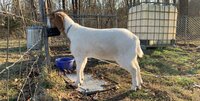HappyFeetHens
Chirping
- May 22, 2018
- 34
- 36
- 57
One of my Boer does is a yearling (born November 2018) and she’s just so small for her age. She’s a normal height, very long body and nicely built, and at fair, we were told she was built very well, with a nice long body and neck, but simple too small. She has no depth, little width, and I just don’t know how to fatten her up. She’s a very active goat, has tons of space and runs around all day, but I feel like there has to be another reason she’s still small. She also has been dewormed so she should not be dealing with an issue like that. She took a long time to get to the normal height of a goat her age but she’s caught up in that arena now. It’s just that she is not keeping on weight.
I feed her about 2 lbs of her grain daily plus free foraging in the woods and shrubbery and access to hay. She’s never been one to eat much hay. Her grain is show feed meat goat grower, it’s steam flaked for easier digestion, and she did initially gain a lot on it, but she’s gotten to a plateau. If I feed more than around 2 lbs, she stops eating it.
We feed our own hay (which is primarily timothy), but I am thinking if I start buying alfalfa pellets (for goats) this may benefit her with the higher fat? It will be more expensive but I think it will be worth it if I can get her to start gaining and filling out. I am getting my show wethers soon as well and I was thinking it would be good to reevaluate our feeding before we get them. So...
Is alfalfa hay (chopped, pelleted, either way) going to be beneficial for my goats? Will it help them fill out?
I attached a picture of the doe in question below. Let me know your thoughts!
I feed her about 2 lbs of her grain daily plus free foraging in the woods and shrubbery and access to hay. She’s never been one to eat much hay. Her grain is show feed meat goat grower, it’s steam flaked for easier digestion, and she did initially gain a lot on it, but she’s gotten to a plateau. If I feed more than around 2 lbs, she stops eating it.
We feed our own hay (which is primarily timothy), but I am thinking if I start buying alfalfa pellets (for goats) this may benefit her with the higher fat? It will be more expensive but I think it will be worth it if I can get her to start gaining and filling out. I am getting my show wethers soon as well and I was thinking it would be good to reevaluate our feeding before we get them. So...
Is alfalfa hay (chopped, pelleted, either way) going to be beneficial for my goats? Will it help them fill out?
I attached a picture of the doe in question below. Let me know your thoughts!


